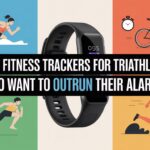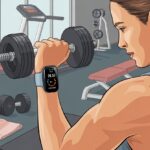Staying fit while bouncing between Wi-Fi hotspots isn’t exactly a walk in the park. That’s where fitness trackers step in, letting us keep tabs on steps, heart rates, and those accidental airport sprints. These little gadgets have evolved from clunky pedometers into tiny health coaches that buzz on our wrists, nudging us to move—even if we’re halfway around the world.
Digital nomads like us need more than just step counters. We crave long battery life for those times we forget chargers, waterproofing for surprise rainstorms or spilled coffee, and syncing that works wherever our latest SIM card comes from. Nobody wants their data stuck on a tracker that’s homesick for fast Wi-Fi.
When we’re choosing the right fitness tracker, a few details really matter. Battery life is huge, especially if we’re off-grid. Comfort and durability count, since we spend hours typing or hiking. Compatibility with our phones and apps saves us from tech headaches—nobody wants to troubleshoot Bluetooth on vacation. We put in a lot of hours testing and researching trackers that make staying active on the road less of a hassle.
Best Fitness Trackers for Digital Nomads
We probably spend more time in airports than gyms, so we need trackers that can keep up with our shifting time zones and, let’s be honest, our snack habits. After wearing these from planes to coworking spaces, we picked our favorites. Here’s what actually helped us move, even when napping sounded better.
Fitbit Inspire 2
If you actually want to hit your step goals while living out of a backpack, this little band makes it surprisingly easy—and even kind of fun.
Pros
- Battery lasts so long, we almost forget it needs charging
- Slim design slides under sleeves and doesn’t snag while typing in cramped cafés
- Tracks sleep and activity with decent accuracy
Cons
- Tiny screen makes us squint more than we’d like
- No built-in GPS, so we still need our phones for runs
- Fitbit Premium subscription costs extra after the free year
We wore the Fitbit Inspire 2 on our last trip and immediately noticed how light and comfortable it felt. Even when our arm fell asleep on a crowded train, the tracker just sat there—not digging in or making us sweat. It’s honestly a relief not to wear a huge watch that screams “I’m counting every heartbeat.”
The battery life won us over fast. We forgot the charger, but the Inspire 2 kept going for well over a week. Waking up and checking our sleep score became a habit, though we’re still not sure our sleep is as wild as the graphs claim.
The reminders to move turned into a weird but helpful motivator. The notifications are nice, but sometimes they get buried if we’re already on our phones. For nomads, this tracker nails the balance between health features and portability—just remember you’ll need your phone for the full experience.
Amzhero Health Tracker
If you want a bunch of fitness features without emptying your wallet, this tracker gets the job done—though it’s not without quirks.
Pros
- Tracks heart rate, blood oxygen, and sleep all day and night
- Battery lasts over a week and a half
- Handles rain, showers, and even the pool
Cons
- Pairing with our phone took some patience
- You need to press a button to wake the screen (tapping would be better)
- Some features feel a little basic compared to pricier brands
Right out of the box, the Amzhero Health Tracker feels light and easy to wear. It comes with two band sizes, so nobody’s wrist gets left out. After a bumpy setup (Bluetooth, why are you always so stubborn?), we finally got it linked up and tracking.
We jogged through airports, raced for trains, and wandered new parks, and the step and heart rate tracking kept up with the pricier models we’ve tried. The color display is bright enough to read even in midday sun. The 15-day battery life meant we could almost forget about charging for two weeks.
The interface did frustrate us a bit—waking the screen needs a button press when a tap would be quicker. Some apps and data seem a little too “barebones,” but for the price, we’re not complaining. The waterproofing is a lifesaver when you get caught in a rainstorm or just decide to swim. If you want simplicity and core features, the Amzhero Health Tracker is a budget pick—even if it tests your patience sometimes.
Garmin vívosmart 5
If you want a no-fuss tracker that keeps up as you country-hop, the vívosmart 5 might be your new travel sidekick.
Pros
- Comfortable for all-day and night wear
- Stays charged for days (so we don’t panic every night)
- Tracks loads of activities, including naps on questionable hostel beds
Cons
- Syncing with phones can feel a bit stubborn
- Display is practical, not flashy
- Some features need your phone nearby, which isn’t always ideal for nomads
Being a digital nomad means always moving, and our wrists shouldn’t feel weighed down. The Garmin vívosmart 5 keeps things light and comfy, so we can wear it nonstop—even when running through airports or crashing on overnight buses. The strap is soft, and swapping bands is easier than figuring out the local menu.
We have to say, the week-long battery life is a relief. Waking up to a dead tracker after a long travel day is the worst, but this one just keeps going. When we do remember to charge it (which isn’t as often as we should), it powers up quickly and is ready for more adventures.
This gadget doesn’t bother with a fancy screen, but it packs in daily stats, heart rate checks, and even stress tracking (for those moments when Wi-Fi fails yet again). Needing the phone for GPS or emergency alerts isn’t our favorite, but the extra safety is worth it. If you want a simple, reliable fitness tracker that keeps up with your wandering, Garmin vívosmart 5 gets a solid nod from us.
BSLIZHEN C60 Fitness Tracker
Want to keep tabs on your health while globe-trotting, but not look like you’re wearing a calculator from the ‘90s? This one’s a solid pick.
Pros
- Colorful, super-bright touchscreen that actually impresses us even in daylight
- Lightweight and slim, so it doesn’t feel like a clunky leash on our wrist
- Handy health tracking that goes way beyond “you should walk more”
Cons
- App setup took us longer than learning how to order coffee in a new language
- Touchscreen needs just a feather touch—too hard, and you’ll think it’s ignoring you
- Battery life could have lasted a bit longer for those of us who “forget” to pack a charger
This little tracker really surprised us. The curved AMOLED color screen looks slick, and more importantly, we don’t have to squint to check stats while sipping coffee in a sunny plaza. Customizing the watch face with over 70 options—or just our own photo—is a fun bonus.
We noticed right away how light and modern it feels. It’s comfortable to wear all day, whether we’re hustling through airports or just chilling on a beach. The health monitoring covers everything: heart rate, blood oxygen, sleep stages, and even a menstrual cycle tracker for the ladies. We especially liked the gentle reminders to move or drink water—because, honestly, sometimes we forget we have legs.
Getting started was a bit clunky (downloading the app, pairing, entering info), but once set up, it’s smooth sailing. A quick tap shows our data, and message notifications keep us in the loop. For nomads who want solid features and a nice design at a wallet-friendly price, the BSLIZHEN C60 is the friendly sidekick we didn’t realize we needed.
Fitbit Inspire HR
If you want a fuss-free tracker to keep your digital nomad life on track (but still leave room for cake), this is a solid pick.
Pros
- You get 24/7 heart rate stats, so you’ll actually know if that hill in Lisbon wiped you out.
- The battery lasts long enough for you to forget where you left the charger.
- Sleep tracking gives you real ammo for arguing about who snores more in the Airbnb.
Cons
- It sometimes thinks typing on your laptop counts as a workout, which is flattering but not exactly accurate.
- No built-in GPS, so it won’t track your “lost in a new city” adventures on its own.
- If you want messages on your wrist, you’ll need to dig into the app and turn on notifications.
Wearing the Fitbit Inspire HR feels like having a mix of constant encouragement and gentle judgment. It nudges you to take a few more steps—usually to find coffee.
When you hit your activity goal, it celebrates with the kind of enthusiasm you’d expect for walking to the snack drawer.
The band feels comfy and never gets in the way, even when you’re frantically typing or wrestling with travel adapters. It’s waterproof, too, so if someone throws you in a pool (accidentally or for “team-building”), it survives.
I really wish it had built-in GPS. I love wandering off the official city walking tours, and my sense of direction is, well, questionable. Notifications can be hit or miss, and sometimes you’ll miss a ping (maybe that’s a blessing). Still, for the price, it’s a reliable travel buddy that makes you look—and sometimes even feel—like you’ve got it together.
Munnrei Smart Health Wristband
If you’re hunting for a fitness tracker that won’t weigh you down or hit you with annoying app fees, the Munnrei Smart Health Wristband is a strong travel companion.
Pros
- It stays super comfy and light—sometimes you forget you’re even wearing it.
- Tracks dozens of sports and all the usual health stats.
- The app is free for life, so your wallet can breathe easy.
Cons
- No screen, so you can’t sneak a peek at your stats on the go.
- Limited to app notifications—no smartwatch magic on your wrist.
- Doesn’t have the flash of high-end options.
Wearing the Munnrei wristband, I felt like a secret agent quietly tracking missions—except my “missions” were steps and sprints between airports.
It’s so light, I’d forget it was there until the app flashed all the health data I’d racked up.
I liked being able to track everything from soccer games with new friends in Lisbon to a sneaky yoga session in a Panama hostel.
The magnetic charger is super easy—no fighting with weird cables. Plus, the battery lasts ages, so I didn’t have to hunt for outlets in random coffee shops.
Munnrei skips the on-screen drama, so you’ll need your phone for details. That might annoy anyone who loves a quick wrist-glance.
But with great battery life and both nylon and silicone straps, it adapts to any mood or climate. It’s not the flashiest device, but for digital nomads who want travel-friendly health tech with no hidden app costs, it stands out.
AKUMAKA Health Fitness Tracker
If you want good fitness stats without shelling out for subscriptions or flashing a sci-fi watch at the coffee shop, this tracker is an easy win.
Pros
- The app works without monthly payments.
- Battery life is long, and charging is quick.
- Discreet, screenless design.
Cons
- No built-in display for on-the-go metrics.
- GPS piggybacks on your phone, not the wristband.
- Less flashy than most smartwatches.
Setup is a breeze—just charge, sync to the free app, and you’re off. No sneaky subscription fees here.
The battery lasts up to 10 days, so I didn’t stress about packing the charger, even on week-long trips.
This isn’t for folks who want to check messages on their wrist—no screen to obsess over. Notifications come through as a gentle buzz, keeping things private and avoiding embarrassing ringtones during café Zoom calls.
I found the constant health stats super handy, especially when trying to adjust my schedule or spot stress after a long travel day.
It’s great for travel, weighs nearly nothing, and still tracks sleep, heart rate, steps, and even stress. If you want to keep tabs on your health without paying extra or lighting up your arm, this one quietly gets the job done.
LIVIKEY Fitness Tracker Watch
If you need a travel fitness tracker that won’t wreck your budget, this one keeps up with you—and your coffee-fueled steps.
Pros
- Monitors heart rate and sleep surprisingly well for a wallet-friendly tracker.
- One quick charge lasts a whole week, even if you forget your charger in a hostel.
- Waterproof build handles rainy runs and accidental coffee spills.
Cons
- The QR code for setup sent me to a site sketchier than a midnight bus ride.
- The screen’s a little small, so squinting might become your new arm workout.
- No built-in GPS, so mapping treks through unfamiliar cities isn’t its thing.
Wandering with the LIVIKEY Fitness Tracker Watch, I felt like a budget superhero. It tracks steps, heartbeats, and even how terrible hostel sleep really is—way more accurately than I expected for the price.
Staying charged on the road is easy. I got a whole week between charges, which is perfect since outlets in airports are rarer than polite cab drivers.
The waterproof rating meant I could sweat it out in monsoon season and still check my step count after.
LIVIKEY does a lot right, but that first app setup made me pause. The QR code landing page looked sketchy enough to make me double-check my credit card statement. And when I tried to check my heart rate mid-run, the screen felt just a bit too tiny for my rushed glances.
If you need GPS routes, look elsewhere. But for step counting and basic health tracking, this tracker gets the job done without bells, whistles, or scary price tags.
RUXINGX Fitness Tracker Watch
For digital nomads, this tracker is like that friend who always has snacks and charger cables—reliable, versatile, and there when you need it.
Pros
- Swapping out four different straps lets you feel like a fashion icon, even in sweatpants.
- The battery lasts longer than most Zoom calls.
- Tracks just about everything except how many times you’ve lost your hotel key.
Cons
- The watch face is a bit chunky if you’re trying to blend in with dainty jewelry.
- You can read messages, but you’ll need your phone to reply.
- The user manual left me playing a bit of smartwatch hide-and-seek with some features.
The RUXINGX Fitness Tracker made me feel like a digital nomad detective, always one step ahead of my own health. Changing up the bands is easy, so matching my ever-shifting “work from anywhere” vibe is finally possible.
Getting updates on steps, heart rate, and sleep cycles (including how many hours I toss and turn thinking about flights) gives me peace of mind.
The battery life really isn’t just hype—mine powered through days of workouts, travel days, and nights out. No more mid-week panic about plugging in another device.
I liked seeing all my notifications on my wrist, even if replying means reaching for my phone.
Not everything’s perfect. The face takes up some wrist real estate, so if you’re aiming for “undercover fitness enthusiast,” it stands out.
Figuring out all the functions took more trial and error than I wanted, but once set up, it ran smoothly. For the price, I’d say this is a dependable travel companion—one that probably gets more steps than my luggage ever will.
Amazfit Band 7
If you want a reliable, no-nonsense tracker that doesn’t quit halfway across Bali, the Amazfit Band 7 really does deserve a spot on your wrist.
Pros
- The battery honestly sticks around longer than our travel laundry—up to 18 days on a single charge.
- Crisp, roomy display that doesn’t make us squint every time we check our steps.
- 120 sports modes, so it tracks pool laps, bike rides, and even desk-chair marathons.
Cons
- Alexa’s voice on your wrist only helps if we’re within Bluetooth range.
- The screen feels a bit small if you’ve got big thumbs or, well, old eyes.
- Setting up all the tracking features can be a patience test.
When we put this band on, the first thing we noticed was how light it felt. Honestly, we barely remembered we were wearing a fitness tracker at all.
That made it weirdly fun every time we checked our heart rate or steps. The bright AMOLED screen popped up with our stats, and scrolling through everything was easy—even when we balanced a coffee and a backpack.
Old fitness bands made us guess if we’d walked 5,000 or 15,000 steps. This one just spells it out, no drama.
We loved not having to chase a charger every night. No joke, after airport security, three time zones, and a sunrise hike, our Band 7 still had plenty of juice.
There’s no shortage of sports to track, either. We pretended to be expert swimmers, runners, and maybe even tried yoga (badly), and the tracker kept up without rolling its digital eyes.
Alexa only helps when our phone is close, and that’s not always true when we’re on the move. The screen’s wide enough for most things, but if we forget our reading glasses, we’ll probably just guess the numbers.
It took us a couple of flights to figure out where sleep and stress tracking hid in the menus. Once we set it up, everything worked smoothly.
Buying Guide
Let’s be real—picking a fitness tracker feels harder than grabbing a snack at the airport. No one needs a PhD to make a solid choice, but wow, the options can feel endless.
Battery life? That’s huge. Who wants to chase down a charger every night? If you’re busy, a tracker that goes a full week (or more) between charges is honestly a game-changer.
Key Features to Compare
| Feature | Why It Matters |
|---|---|
| Battery Life | No daily charging stress |
| GPS | Tracks our wild wanderings |
| Water Resistance | Survives rain, showers, and sweat |
| Notifications | Lets us ignore emails in style |
| Size & Comfort | Won’t annoy our wrists all day |
Let’s just say it: style matters. Nobody wants a clunky brick strapped on their wrist. Go for something light and sleek that won’t shout “I’m tracking steps!” at every meeting.
Syncing can make or break the experience. Most trackers rely on apps to show your stats, so check whether the one you want works well with your phone.
Think about what you actually need. If you just want step counts, keep it simple. But if you’re training for a marathon (or maybe just running late a lot), features like heart rate and GPS might come in handy.
- Fitness Tracker Error Code 401 Fix: Stop Your Watch From Throwing Tantrums - February 17, 2026
- Best Smartwatches for EMS Workers: Wrist Gadgets That Save More Than Just Time - February 17, 2026
- How to use a fitness tracker for WhatsApp without accidentally starting a marathon - February 16, 2026
















